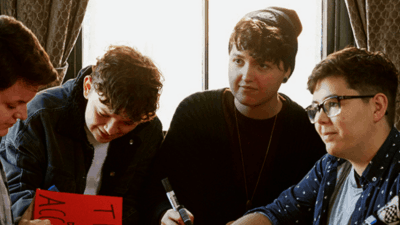
Seven survivors of conversion practices describe its lasting, damaging impact
‘Whenever I remembered the treatment I’d had, I would start physically shaking,’ – survivors of conversion practices share their experiences.
Shockingly, conversion practices remain legal in the UK. And while this remains the case, LGBTQ+ people are at risk of harm. According to the Government's LGBT Survey, 7% of LGBT+ people have been offered conversion therapy, rising to 13% of trans people and 10% of asexual people.
Behind those cold numbers are real people – many of whom still carry with them the long-lasting emotional scars of being made to feel broken. Of being told that who they are is wrong, and that they need to be ‘fixed’ or ‘cured’.
Below, seven survivors share their harrowing experiences of this degrading practice – and the lasting damage it has had on them.
1. “The guilt around my sexuality is hard to shake.”
‘I went into total denial about my sexuality and embraced the idea that I had been “cured”. At the same time, my mental health bombed and my self-harm increased dramatically. In 2009, I tried to kill myself.
“It was only last year, aged 38, I finally accepted that I am gay. Even today, when I know that God loves me for who I am, the guilt around my sexuality is so hard to shake.’
George – a gay woman in her 30s
2. “It is still difficult to see how I am worthy of love.”
‘My pastor, along with his wife and a counsellor, did all they could to convince me that it was wrong to be trans. Even though I’m unsure what I believe anymore, I still live with the fear that I will go to hell.
One of the most destructive impacts was that I began to believe I was unlovable. After all, if I was being told that even God couldn't bear who I am, then it was, and sometimes still is, difficult to see how I am worthy of love.’
Liam – a trans man in his 30s
3. “I started to wonder if the therapist was right.”
‘It took years for me to seek mental health support again, in case the same thing happened. I started to feel hatred towards myself and a fear of engaging with people who might have supported me – whether that was the LGBT community or the South Asian community.
And I became insecure in my relationship. I started to wonder if the therapist was right: had I been used by my partner? Or groomed? That took a long time to overcome.’
Amir – a gay man in his 20s
4. “I have a difficult time with relationships, and intimacy scares me.”
‘Today I struggle with trauma, PTSD, and an eating disorder which are all linked to my conversion therapy experiences.
I have a difficult time with relationships, and intimacy scares me. A lot of people can’t comprehend what it’s like to have experiences like mine, even LGBT people. My parents still don’t understand why I didn’t want to have conversion therapy, or why it was so damaging. They think all therapy is a good thing.’
Eli – a gay man in his 20s
5. “I’d still have flashbacks from my sessions 40 years later.”
‘Whenever I remembered the treatment I’d had, I would start physically shaking. In that sense you could say that the therapy “worked”, in that it affected my body. But, in terms of my mind, and my thoughts, it only made me hate myself more.
The treatment didn’t stop, or even decrease, my feelings of dysphoria. I struggled with it for decades. It was only when I retired early – aged 55 – that I felt I could live openly as myself. And while things got so much better, I’d still have flashbacks from my aversion therapy sessions 40 years later.’
Carolyn – a trans woman in her 70s
6. “My therapy sessions put the shame and self-hatred I felt into overdrive.”
‘Conversion therapy stole precious time I could have spent exploring my sexuality, learning about myself, and building my relationship with my parents. At a certain point I thought I had become asexual, and this felt like an accomplishment.
It also took away my self-confidence. Because if I had truly believed that conversion therapy was right, what else was I wrong about? My therapy sessions put the shame and self-hatred I felt as a teenager into overdrive. I felt responsible for changing myself, and if I didn’t manage this, then I would have failed yet again.’
Joe – a gay man in in his 30s
7. “Dating has been impossible at times ... sometimes I have felt physically sick.”
‘My pastor taught me to be afraid of the secular world and even of Christians with more liberal views. I’ve also found it difficult to become part of the LGBT community, since I was taught to fear LGBT people.
Dating has been impossible at times – sometimes I have felt physically sick when starting a relationship because the feelings of “I shouldn't be here” come back so strongly.’
Emily – a gay woman in her 30s
Some names have been changed.
All of these stories can be read in full on the Ban Conversion Therapy website.
If you’ve been impacted by any of the issues discussed this article, visit the Ban Conversion Therapy website for a list of support services.



